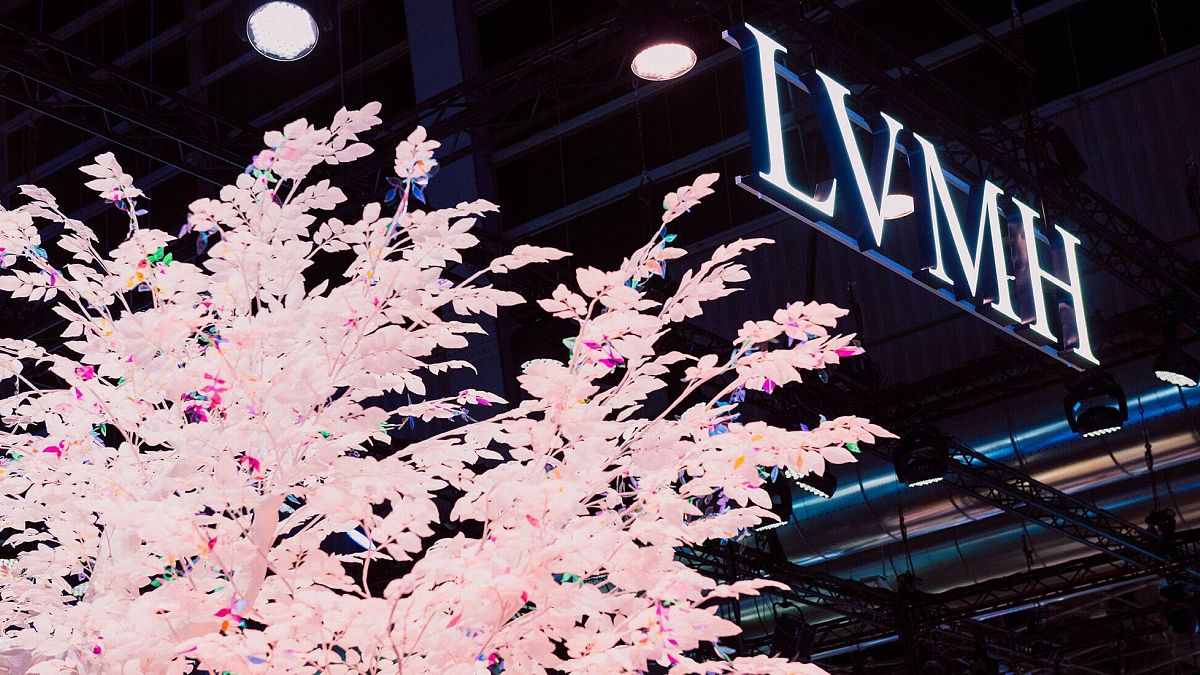Euronews Next speaks to LVMH, L’Oréal and a French AI company to see if the technology is here to stay.
Fashion and technology meet at the Viva Technology fair in Paris this week, with artificial intelligence (AI) taking centre stage.
While the tech is being embraced, there are fears it could stifle creativity.
“Our use of AI is clearly long-term,” Gonzague de Pirey, chief officer of Omnichannel and data at the luxury conglomerate LVMH told Euronews Next.
“We’re in the luxury business. In fact, we don’t really follow fashion phenomena, we’re very wary of that,” he said at an adorned LVMH stand that takes you through a so-called “dream garden” with its meticulously hand-crafted white paper foliage.
One of its brands, Dior, shows off screens that detail how AI and generative AI help create display windows, visual searches of products, and anticipate logistics flows.
It also has an AI platform that can aggregate customer comments from multiple channels, interactions with customer service, satisfaction surveys, live shopping sessions and more.
But LVMH is not getting swept away in the AI buzz.
“Ethically we use AI not to replace our staff, but to lift our team,” said de Pirey.
The company is also careful when it comes to data. Staff are not allowed to use public chatbots such as ChatGPT, but LVMH has a more protected private AI system.
“Our employees and customers’ data is something we have to be very careful about,” said de Pirey.
“It’s not just customer data, it’s also data that is sensitive for the organisation. We’re very, very careful, but we’re in a world, in the luxury sector, where we create a lot of things, and our creations themselves need to be protected,” he added.
Is AI killing or enhancing creativity?
But he warned that AI “could kill” that creativity.
“If we misuse or abuse AI, our creatives will no longer be creative. On the contrary, this tool has been proven to boost the creativity of our designers, creators, and our art directors,” de Pirey said.
Using AI for supply chains is one area that could help fashion companies get collections out more quickly and, perhaps, more sustainably.
“We created this collection from scratch in 21 days,” said Raul Cruz Bonilla, vice president of French AI luxury company Imki, referring to some denim ensembles on display.
He said it would usually take at least six weeks to get these types of denim samples produced.
Imki’s technology is a generative AI for the luxury industry, which is adapted to clients so they can integrate their style.
The company says by integrating Imki into their processes, their clients gain lead time, from the first creative explorations to the iteration and design phases, right through to the product’s technical finalisation.
By producing the images, the samples can be validated so they do not have to be made, which saves material.
“It will never kill creativity. It will enhance creativity. It would kill the people, the stylists who don’t know how to use AI,” Cruz Bonilla said.
“It will leverage your creativity. It will make you stronger. Karl Lagerfeld used to say, I’m a computer who stops all the images in my head. Imagine having all the images of the web you’re on and having access to the brain of Karl Lagerfeld”.
How the beauty industry is using AI
As for the beauty industry, AI is not a novelty.
“We started using AI 10 years ago, and I think that L’Oréal is a company that strongly believes in research because we were started by chemists over 115 years ago,” said Guive Balooch, the company’s global managing director for augmented beauty and open innovation.
But he said “probably half” of what they have created recently is powered by AI “because there’s enormous value to it”.
Their virtual makeup simulators are machine learning-based and skin diagnostic technology is built off machine learning algorithms, Balooch told Euronews Next.
“We have new AI-based launches like Beauty Genius, where we can use virtual beauty assistants that don’t just give you generic answers, but use data that’s enriched from our R&D that will allow you to actually have advice that takes into account multiple factors to be able to give you the right recommendation,” he added.
As for the future of AI in beauty, Balooch said it could help answer the hundred-year-old question in beauty, which is what is the right product for me?
“I think that’s because each individual lives in a certain place, has a certain lifestyle and has a certain biology, and those things are a mystery to people and the accessibility of that will become much better with AI,” he said.
“It’s already happening, and we will be able to tell you if you have a certain biomarker in your skin, whether or not retinol or one of the products is going to be suited for your biology, and you will no longer have to guess whether or not a product’s right for you”.

